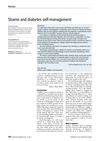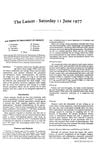 43 citations,
November 2019 in “American Journal of Clinical Dermatology”
43 citations,
November 2019 in “American Journal of Clinical Dermatology” FAGA diagnosis uses blood tests and trichoscopy, with treatments like topical minoxidil, oral anti-androgens, and hormone-modulating drugs.
 June 2023 in “Stem cell reviews and reports”
June 2023 in “Stem cell reviews and reports” Stem cell therapies could be a promising alternative for hair loss treatment, but more research is needed to understand their full potential and safety.
16 citations,
February 2014 in “Iranian Red Crescent Medical Journal” Polycystic Ovary Syndrome (PCOS) affects Iranian women's feelings of femininity and self-image.
 January 2024 in “Photodiagnosis and Photodynamic Therapy”
January 2024 in “Photodiagnosis and Photodynamic Therapy” Using minoxidil with laser therapy is more effective for female hair loss than minoxidil alone.
 10 citations,
May 2009 in “Sexual and Relationship Therapy”
10 citations,
May 2009 in “Sexual and Relationship Therapy” The document concludes that hormone therapy is essential for treating gender dysphoria, with specific drugs and monitoring protocols recommended for safety and effectiveness.
 January 2025 in “Journal of Cutaneous and Aesthetic Surgery”
January 2025 in “Journal of Cutaneous and Aesthetic Surgery” Low-level laser therapy effectively improves hair growth in androgenetic alopecia with minimal side effects.
 2 citations,
June 2022 in “International Journal of Biomedicine”
2 citations,
June 2022 in “International Journal of Biomedicine” The review suggests a comprehensive approach to treat hirsutism, focusing on hair removal, medication, and managing emotional effects.
1 citations,
May 2022 in “International Journal of Trichology” Hair camouflage techniques can help manage hair loss and boost confidence.
 16 citations,
January 2015 in “Current problems in dermatology”
16 citations,
January 2015 in “Current problems in dermatology” Alopecia Areata is an autoimmune hair loss condition that needs more research for better treatments.
 8 citations,
April 2014 in “Practical Diabetes”
8 citations,
April 2014 in “Practical Diabetes” Feeling shame can make it harder for people with diabetes to take care of their health.
August 2024 in “Journal of Photochemistry and Photobiology B Biology” Combining light therapy with certain substances improves hair growth in people with hair loss.
 38 citations,
February 2016 in “Surgery Journal”
38 citations,
February 2016 in “Surgery Journal” Facial plastic surgery has evolved to focus on less invasive techniques and innovative technologies for cosmetic and reconstructive procedures.
 22 citations,
November 2014 in “Psychiatric Clinics of North America”
22 citations,
November 2014 in “Psychiatric Clinics of North America” Stress can worsen skin conditions and affect mental health, so doctors should include stress management in skin treatment.
 17 citations,
January 2007 in “Popular Communication”
17 citations,
January 2007 in “Popular Communication” Makeover TV shows promote unrealistic beauty standards and suggest women's worth is based on looks.
 November 2023 in “International Journal of Medical Sciences”
November 2023 in “International Journal of Medical Sciences” New regenerative medicine-based therapies for hair loss look promising but need more clinical validation.
 49 citations,
July 2004 in “Anesthesiology”
49 citations,
July 2004 in “Anesthesiology” The document concludes that more research is needed to understand how to treat muscle pain with drugs.
 6 citations,
June 2022 in “Frontiers in Psychiatry”
6 citations,
June 2022 in “Frontiers in Psychiatry” Many patients with various medical conditions experience anxiety, which worsens their quality of life and raises healthcare costs.
 11 citations,
September 2013 in “Otolaryngologic Clinics of North America”
11 citations,
September 2013 in “Otolaryngologic Clinics of North America” The document concludes that improving the appearance of posttraumatic facial scars is possible with careful treatment and realistic expectations.
 8 citations,
January 2012 in “Dermatology”
8 citations,
January 2012 in “Dermatology” The HPV vaccine may be linked to temporary hair loss in children, but the benefits outweigh the risks.
 June 2021 in “International Journal of Ayurvedic Medicine”
June 2021 in “International Journal of Ayurvedic Medicine” Phytoconstituents from Cyperus Rotundus may help treat hirsutism by interacting with the 5 α reductase enzyme.
 10 citations,
January 2014 in “Journal of Mid-life Health”
10 citations,
January 2014 in “Journal of Mid-life Health” Menopause can cause skin issues, and seeing a dermatologist helps.
 1 citations,
July 2015 in “Cambridge University Press eBooks”
1 citations,
July 2015 in “Cambridge University Press eBooks” Testosterone therapy can improve sexual function in women but long-term safety is unclear.
 80 citations,
March 2008 in “Contact Dermatitis”
80 citations,
March 2008 in “Contact Dermatitis” Nearly half of the French individuals surveyed reported having a sensitive scalp, more common in women, often linked to hair loss and symptoms like itching, and triggered by factors including shampoos and pollution.
 53 citations,
June 1977 in “Lancet”
53 citations,
June 1977 in “Lancet” Jaw wiring helps with weight loss but long-term habits are needed to keep it off.
 9 citations,
October 2012 in “Frontiers of Hormone Research”
9 citations,
October 2012 in “Frontiers of Hormone Research” Antiandrogens are the main treatment for hirsutism, with individualized care and safe, affordable options needed.
 September 2006 in “Plastic and Reconstructive Surgery”
September 2006 in “Plastic and Reconstructive Surgery” Hair transplant surgeries can be improved by preserving follicles in a special solution, and surgeries done at outpatient facilities are more profitable than those at hospitals.
 19 citations,
September 2004 in “Reviews in gynaecological practice”
19 citations,
September 2004 in “Reviews in gynaecological practice” Effective hirsutism management requires identifying the cause, combining new and traditional treatments, and setting realistic expectations for patients.
 October 2024 in “International Journal of Molecular Sciences”
October 2024 in “International Journal of Molecular Sciences” Rosa rugosa extract promotes hair growth and could be a natural treatment for hair loss.
 2 citations,
March 2016 in “InnovAiT”
2 citations,
March 2016 in “InnovAiT” PCOS is a common hormonal disorder in women, often involving menstrual issues and increased diabetes risk, managed through lifestyle changes and targeted treatments.
 17 citations,
December 2020 in “Journal of Genetic Counseling”
17 citations,
December 2020 in “Journal of Genetic Counseling” Genetic counselors should be culturally skilled and aware of transgender patients' unique health risks and needs.



























